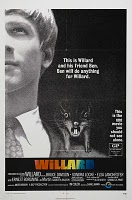
WILLARD
US, 1971, 95 minutes, Colour.
Bruce Davison, Elsa Lanchester, Ernest Borgnine, Sondra Locke, Michael Dante.
Directed by Daniel Mann.
Willard became something of a classic horror film – as well as its sequel, Ben. Willard is a young man who is socially awkward, mocked by his fellow workers – but has the opportunity to wreak havoc on them because of his friendship with a group of rats, led by Ben and Socrates. The film has a good cast with a young Bruce Davison as Willard and veterans Elsa Lanchester and Ernest Borgnine in the cast.
The film was ahead of its time in terms of the animal menace of the mid-1970s including a number of films with rats (and one with Sondra Locke and directed by her, Ratboy).
The film was remade in 2003 with Crispin Glover as Willard.
The director of this film is Daniel Mann, a classic Hollywood director who directed three actresses to Oscars: Shirley Booth in Come Back Little Sheba, Anna Magnani in The Rose Tattoo and Elizabeth Taylor in Butterfield 8.
1. The impact of this animal horror film? Its reality and unreality? Fascination and repulsion? The explanation for its huge box office popularity?
2. The reasons for favourable audience response? Subject, treatment? How 'sick' is this kind of film? The fact that Willard had a sequel?
3. Critics called the film a horror in sunlight. How appropriate? The importance of the Californian atmosphere, houses streets, offices, etc.? The success of having such horror in broad daylight?
4. The authenticity and credibility of the atmosphere: Martin's factory, the ordinary life of the office, the Styles' home etc.?
5. How interesting a character was Willard himself? His weak character, loneliness, the background of his family, his overbearing mother, dead and imposed on father, his mother's friends for example at his birthday? His work at the office absent-mindedness, tolerated by Martin for the time being? His relationship with Joan and her friendliness, the gift of the cat? His lack of self-assertion? A dominated American male?
6. The portrayal of his mother: her worrying about her health, her nagging, her fear, the impact of her death and the removal by her friends, her leaving little wealth to him, the house? Willard’s being affected by his mother?
7. Audience response to the rats? The fascination, the horror of their ugliness? The quick breeding? Ben the evil black rat, Socrates the good white rat? Willard's delight in training them, being friends with them, especially Socrates?
8. Willard's growing malevolence? His vindictiveness against Martin and his setting the rats on the party guests their reaction? His smiling? His involving the rats in his robbery? Socrates and his death at the office and Martin's intervention? (People thinking they are heroic when they kill a rat?) Willard's grief?
9. What caused the change in Willard from weakness to self-assertion? His final vindictive confrontation with Martin, especially in view of the purchase of the house and his getting the sack? Martin's fear and his being covered with the rats, terror and plunging to his death? Audience horror at the visualizing of the rats killing someone?
10. How appropriate a villain was Martin for the film? His business double dealings, his relationship with his wife with the fat woman in the office, trying to turn Joan against Willard etc.? Did Willard have the right to execute justice on him?
11. The eeriness of Ben as villain? Willard drowning the rats and yet their turning on him? The suspense and horror of the rats confronting Willard and then killing him? Did Willard deserve this death?
12. How do such horror films rely on audience values of right and wrong? How do they create tension and fright? Is this good for popular audiences?